“So, what did you gain from your Peace Corps experience?” people often ask me following my return from 26 months abroad in the Republic of Cameroon, Central Africa.
To answer that question in one sentence would group all of my relationships with friends and work partners, on-the-ground experiences and ups-and-downs of living somewhere other than home into maybe 50 words. I tested my ability to describe this experience and came up with this:
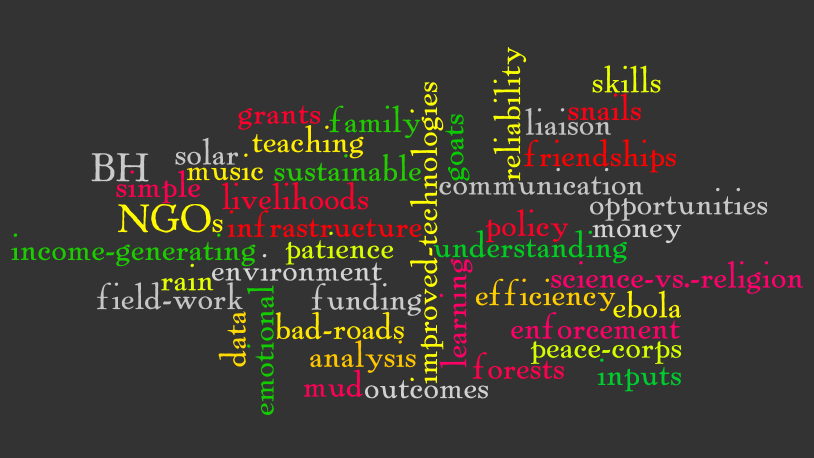
Did that work? No? Well, I’ll have to come-up with a better elevator pitch. In the mean time, here’s the final installment of my blog on my personal experience in Peace Corps Cameroon.
Skills Gained: Below is a narrative of factors that influenced my work experience abroad and took new meaning as each of the 26 months of my service concluded. Patience, communication, understanding, inputs, and peace are just a few in a multitude of aspects that have shaped my work anywhere in the world.
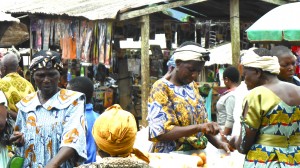
Patience. Learning how to work in a community that has been doing things their own way for many years can have its challenges. While a Peace Corps Volunteer (PCV) may come in with a schedule and a deadline to submit reports and generate meaningful outcomes, most people living in a rural village have their own daily routines that they have been carrying-out in their own specific way since before any millennial was even born. The main limiting factor to working in the area was the seasons. With a short three-month dry season, work must get done quickly, as transportation is quicker and the roads are not muddy and slippery. However, good-road-season also means the perfect time for Cameroonians of the Diaspora or living in larger cities to come back to visit and partake in local festivities. Weddings and funeral celebrations start happening on a bi-weekly basis. Thus, distractions are endless and a PCV is left to wait patiently for people to want to work. This is the season when infrastructural development projects should be carried-out. Nonetheless, if international funding is not available at this precise time, work is put off and becomes slower and requiring more monetary input as the rains approach. Again, enduring patience.
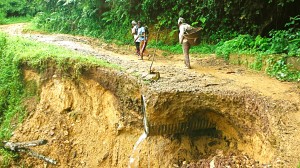
When Cameroonian government workers rely on the government for funding to initiate any projects, top-down development work can be almost stagnant at times and increasingly dependent on the work of non-governmental institutions and foreign funding. As a development agent, I realized NGOs lacked governmental support and all of their incoming funding became the main source of revenue for people managing the organizations. Civil society leaders need to be properly supported through national funding schemes in order for current international funding trends to translate into sustainable livelihood improvements on the long-run. So, the patience I learned, others have been persistently exercising for years.
On a different, yet related note, the manner in which work abroad is evaluated impacts Peace Corps’ development initiatives and the work of national and international development agencies. It is truly difficult to appropriately monitor & evaluate (M&E) a project when, in the case of Peace Corps, PCVs are usually in-country for less than 3 years and it takes time to find the right projects to work on and the right people to work with. Engaging in current projects in the area managed by a previous PCV aids in reducing the gap in knowledge when transitioning from one volunteer to another in the same village, but this is not always an option or a choice all PCVs can undertake. I once heard from a Cameroonian that well-documented M&E for any development project takes a minimum of 5 years. This problem is also a prominent issue with international funding programs: the lack of appropriate M&E originates from funding not being appropriately distributed throughout the progression of a project and usually fully utilized in the beginning stages of a project’s implementation. When I came to understand the truth of this, I began to approach every single moment as a learning experience, yet working efficiently was still limited by time, seasonal changes, and local commitment to progress.
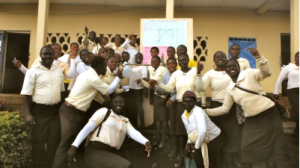
Communication. Teaching abroad has been one of the most satisfying experiences of my Peace Corps stay, since I was able to see some of the effects right away. Teaching gave me the opportunity to engage in optimal personal and professional relationships, through the implementation of first year BCEP courses where I taught basic science in the biology and ecology fields, as well as endeavoring to relate local populations to environmental problems in their locality. I taught at two levels: grades 4-6 at a primary school and 5 classes at a teachers training college. Following the introduction of key concepts and principles of environmental policy, with the teachers-to-be, I expanded into the teaching of improved technologies with lesson plans on: solar cooking, “liter of light” solar power, mud stoves, rain gauges, compost piles, and the tippy-taps hand sanitation stations; all as examples of simple solutions to problems facing the communities. Other avenues for communication with large audiences came through village sensitizations covering 30 villages in the surrounding area. Topics ranged from improved agro-forestry techniques to local law enforcement approaches for villagers and farmers living in and around protected forested areas. Although the science vs. religion dichotomy posed a challenge in the classroom and beyond, in the end we found common ground.
Ultimately, the greatest test of my communication skills came when I acted as a liaison between local community members and groups, and outside funding agencies, including national and foreign NGOs. The enormous disparity in the assessment of costs, distance, time, skills, and the incongruence between strategy and the resolve of the two groups are at the core of the problems we face with current top-down approaches to development work. In the same way that those at the “top” think they know everything about what the “bottom” needs, those at the “bottom” snatch at almost anything coming from the “top”. However, it is no longer sufficient to passively accept the solutions from above, without taking an active part in the determination of needs and strategies for deployment. And, even when that is the case at hand, then the real problems hindering development should be met by those at the “top” within the country, before resorting to outside agencies in the effort to attain the desired development goals.
Understanding. How could I have achieved anything, even engaging in a regular conversation about cooking or farming, without understanding and humility? The first thing that I, as a PCV, had to do was to assess the needs of the area through the use of different data collection methods. How could I understand the needs without attempting to understand the way of life, the rhythms and routines of the community? The first and final response I got from the people in the area was that they needed roads. I was obviously not prepared to provide that, but other opportunities for work did arise with time. Through discussions with members of the community I came to know individuals who were already engaged in improving rural livelihoods with the use of suitable organizational skills, and by demonstrating how dedication and educational skills can bolster development initiatives.
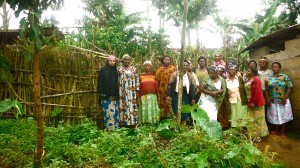
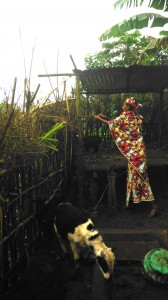
The final project I was engaged in came about through a mutual understanding of needs between two agricultural engineers and an international funding agency. I was offered a $1,000 grant from a U.S.-based company FatPipe Inc. to do a sustainable livelihoods project with women in the area. Two rural female farmer’s groups were the target of intervention as they were already seriously engaged in improved farming techniques. The engineers and I were involved in planning a project that would provide two income generating activities, snail farming and goat rearing, for women and develop their skills in those domains. The foreign company understood women needed aid to realize income generating projects, the engineers worked closely to improve the livelihoods of the women and I understood how to connect the two sides to where mutual understanding of needs was met.

Inputs. My experience in Cameroon underlined the decisive role of local input on conservation policy. My final weeks in Peace Corps service concluded with the opportunity to carry out the fieldwork necessary to fulfill my Masters International program, linked to the Bard Center for Environmental Policy.
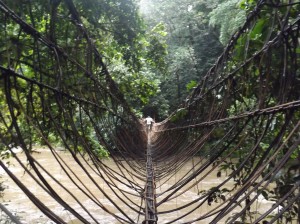
Having lived in a forested landscape in Cameroon, I slowly came to realize that one of the real obstacles hindering the success of conservation intervention policies was the lack of “bottom-up approaches”. This involved understanding the links people have to the forest resources in order to engage them in conservation strategies to protect those resources that their livelihoods depend on the most. One problem conservation efforts face is poaching and unsustainable extraction of natural resources from the forests. The need for immediate monetary gain continues to be one of the reasons for the poaching of forest animals and deforestation of trees, but a lot of people who have relied on these resources for years may be interested in protecting those which sustain their current livelihoods. Often, people from other larger cities travel to the forests to do the poaching and then disappear with the resources; thus, local involvement in law enforcement schemes is necessary.
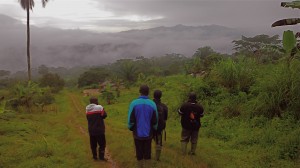
Some organizations have recently started doing this in various protected areas, but more data and M&E will be necessary before conclusions can be drawn as to the most efficient intervention strategies that can enable safe-guarding for forest resources and ecosystem services. With the input I gathered through my fieldwork conducted in the Bayang-Mbo Wildlife Sanctuary alongside and in collaboration with other members of societal groups involved in environmental protection, I believe valuable insights can be gained, through careful analysis, aimed to protect livelihoods and interests of both humans and other species in protected areas, thanks to the information provided by those closest to the forest.
Peace. What is peace? I have volunteered with the Peace Corps and I have heard this term being used in so many different contexts over the years that I am led to believe that each country defines it in different ways. The difficulties a country has faced in the past generally dictate how peace is defined and perceived. Having served in one of the few countries that could call itself peaceful, especially in contrast to neighboring countries that have been facing internal conflicts for decades, I still found myself at odds when thinking about the possibility of Boko Haram, BH, interfering with the peaceful ways of the Cameroonian population. The outcome of their involvement in the country is very present in the minds of Cameroonians and they would prefer not to even engage such a topic of conversation. Similarly, ebola has been a topic of contention and some will even go as far as to say it is another “white man” disease like HIV/AIDS. However, many persons in the country believe it needs to be eradicated from other countries and they will do most anything to prevent it from striking Cameroon. These are the factors that they perceive as potentially obstructing their peace.
Peace is a delicate state of balance among external and internal factors which can never be controlled fully; and, in the country of my service people generally found a way to be at ease amidst existential crises like malaria, ebola, deaths, and BH. After two years I can finally understand their desire to be the peaceful country in Central/West Africa and set that example, and, as it trickles down into society it becomes more apparent that many are trying to overcome serious hardships and still steer away from the chaos they see in neighboring countries. Whether it is because most of the population is not facing famine and most areas still live off the land and the forest, or that the music and friendly gatherings and chatting can be so entertaining, Cameroonians taught me that peacefulness is the one aspect of their society they work hard to sustain.
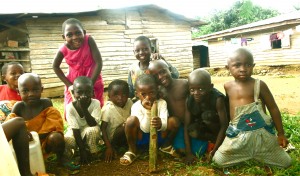
Finally, a shout-out to the “wondaful” (Pidgin for wonderful) people I met and the incredible friendships I now cherish from my time in service. Through it all I learned the importance of finding reliable friends and counterparts in an unknown area in order to facilitate working there, and, establishing a support system with close friends in the Peace Corps family to soar through the emotional “ups-and-downs” and be able to learn from the experience. But, also, I learned how simple life can be once you have all of that.
